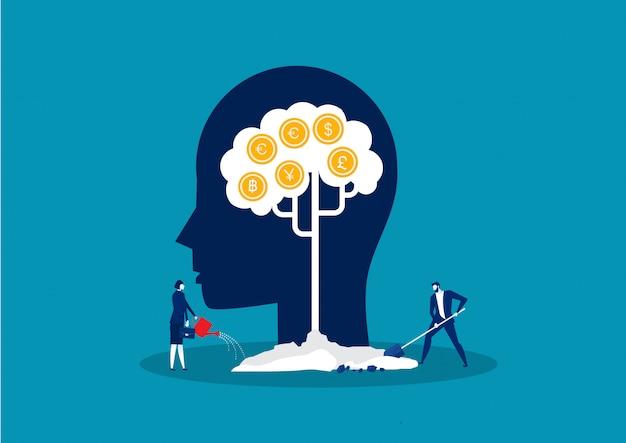As a business owner or an employee, having an owner’s mindset can make all the difference in achieving success. It means taking ownership of your work, being accountable for your actions, and embodying the meaning of ownership in everything you do. Unfortunately, many businesses suffer from a lack of ownership mindset, which can lead to a lack of productivity and success. In this blog post, we’ll dive into the importance of an owner’s mindset, how to develop it, and provide examples of individuals who have successfully embodied this mindset. So, let’s take a closer look at what it means to have an owner’s mindset.
The Importance of Having an Owner’s Mindset
When it comes to running a business or managing a project, having an owner’s mindset can be the difference between success and failure. But what exactly does it mean to have an owner’s mindset? Let’s break it down.
Take Ownership of Your Work
Having an owner’s mindset means taking ownership of your work. This doesn’t just mean taking pride in what you do; it also means taking responsibility for your mistakes and actively seeking out opportunities to improve. When you have an owner’s mindset, you’re always looking for ways to add value and make a positive impact.
Think Big Picture
Another key aspect of having an owner’s mindset is thinking big picture. It’s easy to get caught up in the day-to-day tasks of running a business or managing a project, but it’s important to step back and think strategically about where you want to go. When you have an owner’s mindset, you’re always thinking about the long-term goals and how you can work towards achieving them.
Be Proactive
If you want to have an owner’s mindset, you need to be proactive. This means taking initiative and being proactive in identifying problems and coming up with solutions. When you’re proactive, you’re able to anticipate issues before they arise and take steps to prevent them from becoming bigger problems down the line.
Make Decisions with Confidence
Finally, having an owner’s mindset means making decisions with confidence. When you’re faced with a tough decision, it’s important to be able to analyze the situation, consider all the possible outcomes, and make a decision that you feel confident about. Having an owner’s mindset means trusting your judgment and being willing to take risks when necessary.
In conclusion, having an owner’s mindset is essential for anyone who wants to succeed in business or project management. By taking ownership of your work, thinking big picture, being proactive, and making decisions with confidence, you can achieve your goals and make a positive impact on your team and your organization.
Accountability Mindset
Taking ownership of your life also means taking responsibility for your actions. It means having an accountability mindset. This may sound boring, but it’s a crucial aspect of being a successful owner. Here are some tips to help you develop an accountability mindset:
Admitting Your Mistakes
We all make mistakes, and that’s okay. What’s important is how we handle them. Owning up to your mistakes is the first step to learning from them. Don’t try to shift blame onto others or make excuses. Instead, take responsibility for your actions, apologize if necessary, and learn from your mistakes.
Setting Clear Goals
When you have a clear goal in mind, it’s easier to hold yourself accountable for your actions. Define what you want to accomplish and create a plan to achieve it. Set realistic deadlines and milestones along the way to track your progress. With clear goals in mind, it’s easier to hold yourself accountable for your actions.
Building a Support System
Having a strong support system can help you stay accountable. Find people who share your goals and values and who will hold you to your commitments. Having someone to check in with can help keep you motivated and on track. Plus, it’s more fun to work towards your goals with others.
Celebrating Your Wins
When you achieve a goal or make progress towards it, take time to celebrate your win. Remember to recognize your hard work and acknowledge your accomplishments. Celebrating your wins can help keep you motivated and remind you of why you started in the first place.
Avoiding Procrastination
Procrastination is the enemy of accountability. When you put things off, you’re not being accountable for your time or your goals. Instead, try to stay focused on your priorities and tackle tasks as soon as possible. This will help you stay on track and avoid falling behind.
In conclusion, developing an accountability mindset takes time and effort, but it’s worth it. By admitting your mistakes, setting clear goals, building a support system, celebrating your wins, and avoiding procrastination, you can become a more accountable owner. Remember, taking ownership of your life means taking responsibility for your actions.
Embody Ownership Meaning
If you want to be a true owner, you need to embody ownership meaning. But what does that even mean? Don’t worry; it’s not as complicated as it sounds. Embodying ownership means taking responsibility for everything that happens in your life, owning your mistakes, and taking control of your future. Here are some tips on how to embody ownership meaning and become the ultimate owner.
Take Responsibility for Your Actions
As an owner, you need to take responsibility for your actions. If you make a mistake, own up to it and learn from it. Don’t blame others or make excuses. Own your mistakes and take action to correct them. This will help you grow as a person and show others that you are accountable, reliable, and trustworthy.
Take Control of Your Future
Another way to embody ownership meaning is to take control of your future. Don’t just let life happen to you; make things happen. Set goals, make plans, and take action to achieve them. Don’t wait for someone else to do it for you. You are the master of your destiny, and it’s up to you to take control of it.
Be Resilient and Persevere
When things get tough, it’s easy to want to give up. But as an owner, you can’t afford to give up. You must be resilient and persevere through tough times. Don’t let setbacks defeat you. Learn from them, adjust your plans, and keep pushing forward. Remember, the only way to fail is to give up.
Don’t Compare Yourself to Others
Comparing yourself to others is a surefire way to kill your motivation and confidence. As an owner, you must focus on your own goals and aspirations. Don’t worry about what others are doing or achieving. You are on your own journey, and you must stay true to your own path. Embrace your uniqueness and own it.
Embodying ownership meaning is not something that happens overnight. It takes time, effort, and dedication. But if you are committed to taking responsibility for your life, taking control of your future, being resilient, and ignoring comparisons to others, you will become the ultimate owner in no time. So, go out there, embody ownership, and become the ultimate owner that you were meant to be.
Lack of Ownership in Business
We’ve all seen it: employees who come to work every day, do the bare minimum, and then go home. These employees don’t feel any sense of ownership in the business, which can lead to a lack of motivation and a decrease in productivity. In this subsection, we will explore the reasons why some employees lack ownership in their work and what employers can do to foster a culture of ownership.
Not Feeling Valued
One of the top reasons employees lack ownership in their work is because they don’t feel valued. When employees feel like they’re just a number, they’re less likely to take pride in their work and go above and beyond. Employers can combat this by creating a culture of recognition and appreciation. Even small gestures like a genuine thank you or public recognition can go a long way.
Fear of Failure or Repercussions
Sometimes, employees don’t take ownership because they fear failure or repercussions. This can be especially true in companies with a high-pressure work culture. Employers can help combat this fear by creating a safe environment where employees can take risks and make mistakes without fear of punishment. When employees feel like they have a safety net, they’re more likely to take ownership and innovate.
Communication Breakdowns
Another reason employees might not feel ownership over their work is because of communication breakdowns. When employees don’t understand their role in the bigger picture or how their work impacts the company, it’s easy to feel disconnected. Employers can combat this by fostering open communication and providing regular updates on the company’s goals and progress.
Lack of Autonomy
Finally, some employees might not feel ownership because they lack autonomy in their work. Micro-managing can be a huge demotivator, and it can lead employees to feel like they’re not trusted to do their job. Employers should strive to provide employees with the autonomy they need to do their job effectively and take ownership over their work.
In conclusion, there are many reasons why employees might lack ownership in their work, from feeling undervalued to being micromanaged. By fostering a culture of recognition, creating a safe environment to make mistakes, communicating effectively, and providing autonomy, employers can help inspire a sense of ownership in their employees and boost productivity.
How to Develop an Owner’s Mindset
As a person who wants to develop an owner’s mindset, you must remember that owning something requires more than just paying for it. It involves taking responsibility for it, and ensuring that it’s taken care of. Here are some tips to help you develop an owner’s mindset:
Take Ownership of Your Decisions
Taking ownership of your decisions is the first step to developing an owner’s mindset. This means you take responsibility for the choices you make, good or bad, and learn from them. Recognize that your decisions have consequences, and you need to be accountable for those consequences.
Have a Long-Term Focus
Developing an owner’s mindset requires thinking beyond what’s happening today or tomorrow. It requires you to focus on the long-term and take actions that will benefit you in the future. This means setting goals, making plans, and taking steps to achieve those goals.
Be Proactive, Not Reactive
Owners are proactive, while non-owners are reactive. As someone who wants to develop an owner’s mindset, you must take proactive steps to achieve your goals. Don’t wait for things to happen; make them happen.
Be Willing to Take Risks
Taking risks is a part of owning something. You must be willing to take calculated risks and move out of your comfort zone. However, remember to weigh the risks and benefits before taking any action.
Surround Yourself With Like-Minded People
Surround yourself with people who have an owner’s mindset. Find individuals who support your goals and challenge you to be better. This will help you stay focused and motivated.
Embrace Failure
Owners understand that failure is a part of the process. They embrace it, learn from it, and use it as a stepping stone to success. Don’t let failure discourage you; instead, use it as an opportunity to learn and grow.
Take Action
Developing an owner’s mindset requires action. You need to take action and make things happen. Start small, but take consistent steps towards your goals.
By following these tips, you can develop an owner’s mindset. Remember, it’s not just about owning something; it’s about taking responsibility for it and making it thrive.
Taking Ownership at Work: Examples of the Owner’s Mindset
As we discussed in the introduction, having an owner’s mindset means taking ownership of your work and responsibilities, treating them as if they were your own. But what does this look like in practice? Here are some funny and relatable examples of taking ownership at work:
Owning Up to Mistakes
Let’s face it; we’ve all made mistakes at work. Whether it’s sending an embarrassing email to the wrong person or forgetting to double-check a crucial detail, owning up to your mistakes is an essential part of having an owner’s mindset. Instead of trying to hide your blunder or blame someone else, admit your mistake, and take steps to fix it. Not only will you gain the respect of your colleagues, but you’ll also learn from your error and improve in the long run.
Stepping Up to the Plate
Sometimes, work can be overwhelming, and it’s easy to feel like you’re in over your head. However, an owner’s mindset means stepping up to the plate, even if it’s outside of your comfort zone. Take on new challenges, offer to help your colleagues when they’re swamped, and always be willing to learn and grow. By doing so, you’ll not only improve your skills, but you’ll also show your employer that you’re a valuable team player.
Going Above and Beyond
We all have that one colleague who always goes above and beyond, putting in extra effort to ensure a project’s success. If you want to have an owner’s mindset, strive to be that person. Take the time to understand the project’s goals and objectives, and then put in the extra effort to make sure everything is done to the best of your ability. Your employer will appreciate your dedication and hard work, and you’ll feel a sense of pride in a job well done.
By incorporating these examples of taking ownership at work and adopting an owner’s mindset, you can improve your work performance, gain the respect of your colleagues, and contribute to your company’s success. So, don’t wait; start taking ownership today!
How to Develop an Owner Mindset
You may have heard people talk about developing an owner’s mindset. It’s not just about owning your own business or property; it’s a mindset that transcends material possessions. Here’s how you can start developing your own owner’s mindset.
Take Responsibility for Your Life
An owner’s mindset involves taking control of your life and taking responsibility for everything that happens to you. Stop blaming others for your problems and start taking ownership of your actions. Instead of saying, “I can’t do this,” ask yourself, “How can I do this?”
Understand the Power of Mindset
Your thoughts and beliefs shape your reality. If you believe that you can achieve something, you’re more likely to be successful. On the other hand, if you think you’re going to fail, you’re more likely to fail. Start paying attention to your thoughts and try to shift them to a more positive and productive mindset.
Seek Opportunities
Developing an owner’s mindset means actively seeking opportunities to grow and improve. This could mean seeking out new challenges, taking on more responsibility, or learning new skills. Don’t wait for opportunities to come to you; go out and find them.
Value Your Time
Time is your most valuable asset. Don’t waste it on things that aren’t important or don’t add value to your life. Instead, prioritize your time and focus on the things that matter most.
Learn From Your Mistakes
Mistakes are part of the learning process. Instead of beating yourself up for making a mistake, use it as an opportunity to learn and grow. Ask yourself, “What can I learn from this experience? What will I do differently next time?”
Take Action
An owner’s mindset means taking action and making things happen. Don’t just sit around waiting for something to happen; be proactive and take the steps necessary to achieve your goals.
In conclusion, developing an owner’s mindset is all about taking control of your life, taking responsibility for your actions, and actively seeking out opportunities to grow and improve. With a little bit of effort and a positive attitude, you can start developing your own owner’s mindset today.
Do You Naturally Embody Ownership? Why
As someone who has been called bossy more times than I can count, I like to think that the answer to this question is a resounding yes. But what does it actually mean to embody ownership? And why do some people seem to have it while others struggle to find it? Here are a few reasons why I believe some people just naturally have that owner’s mindset:
You’re a Control Freak
Let’s be real: some people just can’t help but be in control. Maybe it’s because they think they know best, or maybe it’s because they’re secretly terrified of what might happen if they’re not the ones calling the shots. Whatever the reason, if you’re the kind of person who always needs to be in charge, you might just naturally embody ownership.
You’re a Perfectionist
Similar to control freaks, perfectionists tend to have a very clear vision of what they want and how things should be done. And while this can be a great quality to have in many situations, it can also make it difficult to work with others or delegate tasks. If you find yourself struggling to let go of control because you want everything to be just so, you might just have that owner’s mindset.
You’re a Natural Leader
Some people are just born leaders. They have a charisma and confidence that draws others to them, and they instinctively know how to inspire and motivate others. If you find that others naturally look to you for guidance and direction, you might just have that owner’s mindset.
You Take Responsibility
At the end of the day, embodying ownership is really just about taking responsibility for yourself and your actions. Whether you’re the CEO of a company or just trying to navigate your way through life, being willing to own up to your mistakes and do what needs to be done to make things right is what separates the true leaders from the rest of the pack.
So, do you naturally embody ownership? If you answered yes to any of the above, then chances are the answer is a resounding yes. And even if you didn’t, don’t worry – it’s never too late to start developing that owner’s mindset and taking control of your life and your future.
What It Means to Have an Ownership Mindset
When we think of ownership, we often think of possessions – our cars, our homes, and the like. However, the concept of ownership goes beyond material possessions. An ownership mindset is a way of thinking that focuses on taking responsibility for one’s actions, decisions, and outcomes. It’s about recognizing that you have the power to control your circumstances, and it’s about making choices that will move you closer to your goals.
Setting Goals and Taking Initiative
One example of an ownership mindset is setting clear goals and taking the initiative to achieve them. Instead of waiting for opportunities to come your way, you actively seek them out. You develop plans to achieve your goals, and you take action to make them happen.
Taking Responsibility for Your Mistakes
Another aspect of an ownership mindset is taking responsibility for your mistakes. Instead of blaming others or making excuses, you acknowledge your role in the situation and take steps to make things right. This means being accountable for both your successes and your failures.
Overcoming Challenges and Learning from Them
An ownership mindset also involves overcoming challenges and learning from them. When faced with obstacles, you don’t give up or look for a quick fix. Rather, you approach the situation with a growth mindset and seek to learn from the experience. You view challenges as opportunities to learn and grow, rather than as roadblocks to your success.
Embracing Change and Adapting to New Situations
Finally, an ownership mindset involves embracing change and adapting to new situations. You recognize that change is inevitable, and you welcome it as an opportunity to learn and grow. You don’t resist change or cling to the familiar, but rather you are open to new experiences and willing to take risks.
Adopting an ownership mindset can be challenging, but the benefits are well worth it. By taking ownership of your actions, decisions, and outcomes, you can achieve greater success in your personal and professional life. So, take the first step today and start thinking like an owner!
The Importance of Self-Appraisal Comments
An ownership mindset is not just about taking responsibility for the tasks you’ve been assigned; it’s also about taking ownership of your own growth and development. Self-appraisal comments are an essential part of this process.
What are self-appraisal comments
Self-appraisal comments are essentially a written reflection on your own performance. They provide an opportunity for you to evaluate yourself objectively, highlighting your strengths and weaknesses.
The benefits of self-appraisal comments
Self-appraisal comments do more than just provide a record of your progress. They can also help you identify areas where you need to improve. By acknowledging your weaknesses, you can actively work to overcome them. Furthermore, highlighting your strengths can help you build confidence and pride in your work.
Taking an honest approach
When writing your self-appraisal comments, it’s important to be honest. Don’t be tempted to gloss over your weaknesses or exaggerate your achievements. This will only hinder your growth and development in the long run. Instead, be frank and objective about your performance.
A little humor goes a long way
Writing a self-appraisal can be a daunting task. The prospect of evaluating your own work can be scary and lead to self-doubt. Injecting a little humor into your comments can go a long way in making the process less intimidating.
Wrapping up
In conclusion, as an owner, it’s vital to have an ownership mindset. Self-appraisal comments provide the perfect opportunity to evaluate your own progress honestly. By being honest, humble, and a little humorous, you can turn a potentially overwhelming task into an enjoyable and productive experience.
Employee Mindset vs. Owner Mindset: What’s the Difference
We’ve all heard the classic distinction between an “employee mindset” and an “owner mindset.” But what does it really mean to have an owner mindset? And how is it different from the way employees think?
Let’s take a closer look at the key differences between an employee and an owner mindset.
Ownership Mentality
First and foremost, having an owner mindset means taking ownership of your work. While employees may view their roles as merely a job to do from 9-to-5, owners see themselves as essential contributors to the success of their business.
This ownership mentality drives owners to take initiative, go above and beyond to exceed expectations, and prioritize long-term success over short-term wins.
Risk-Taking
Another notable difference between employee and owner mindsets is risk-taking. As an employee, taking risks can be scary. After all, if things go wrong, it may not be your problem to solve.
Owners, however, know that risk-taking is necessary to achieve greatness. They’re not afraid to take calculated risks, and they understand that failure is part of the process.
Growth Mindset
In addition to taking ownership of their work and taking risks, owners have a growth mindset. They’re constantly looking for ways to improve themselves, their business, and their team.
Owners understand that there’s always room for growth and are willing to put in the hard work necessary to achieve their goals.
Long-Term Thinking
Finally, owners have a knack for long-term thinking. They don’t just focus on short-term wins; they understand that big-picture success takes time and effort.
While employees may be happy to reach next month’s sales quota, owners are thinking about next year’s growth targets. They’re constantly strategizing and planning, knowing that the decisions they make today will have a significant impact on the future success of their business.
In summary, having an owner mindset means taking ownership, taking risks, having a growth mindset, and thinking long-term. While employees may have a different perspective, adopting an owner mindset can help them go above and beyond in their work and ultimately lead to greater success.



